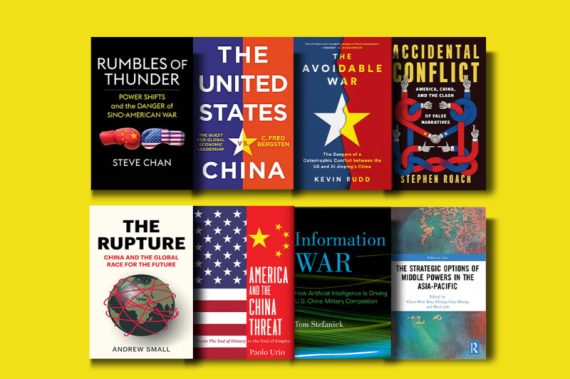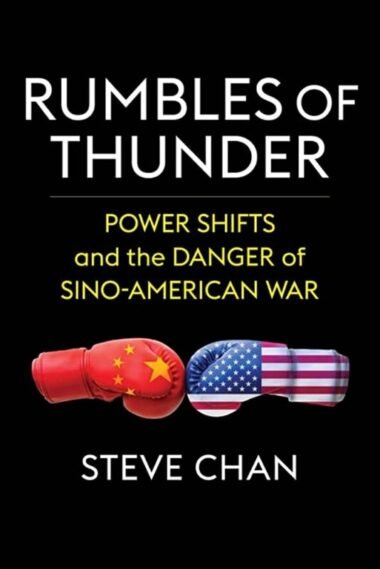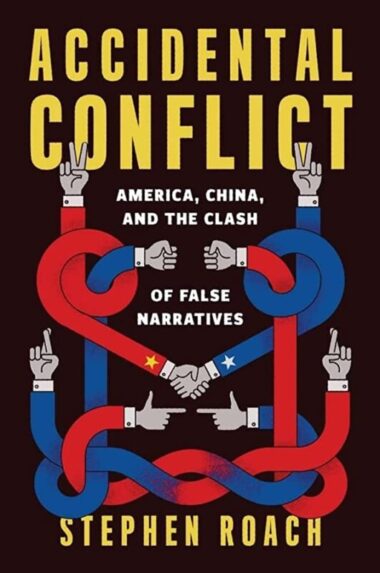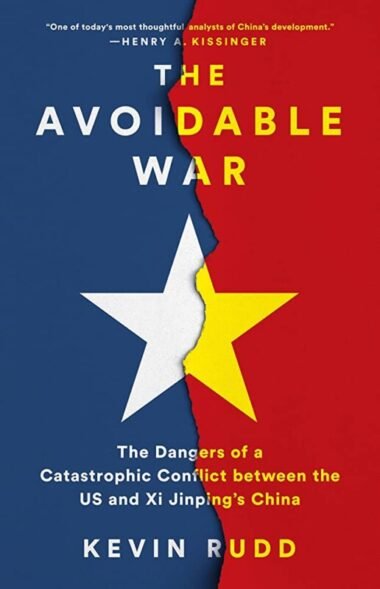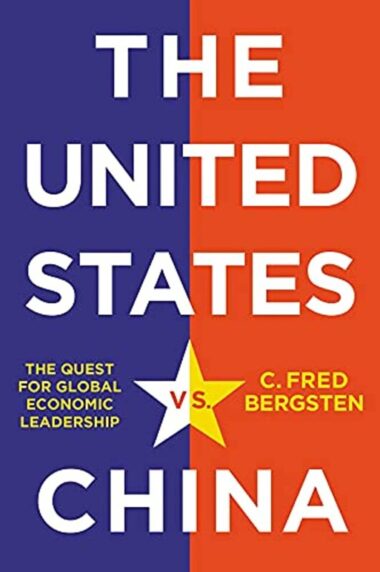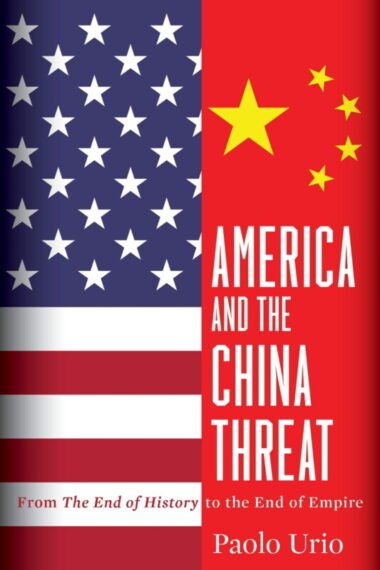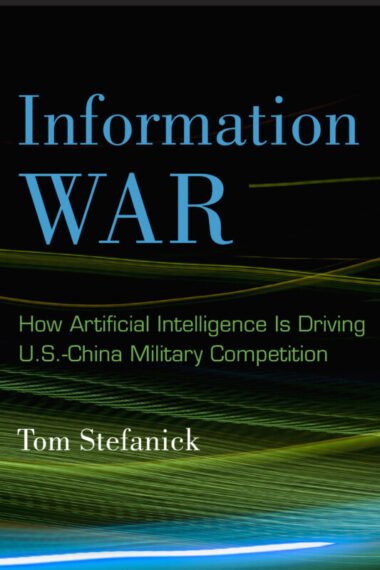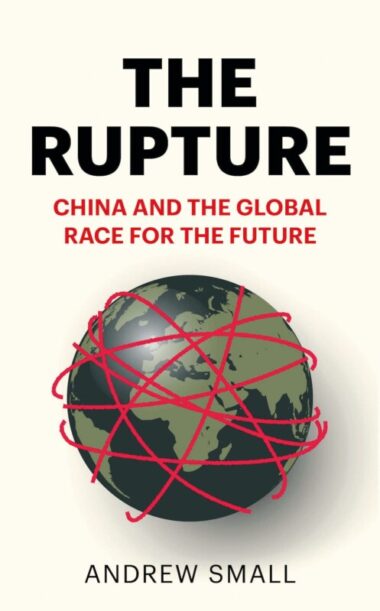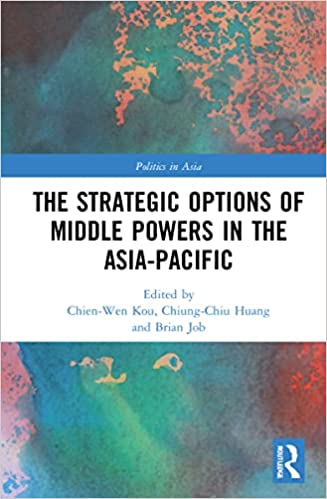T
he Pacific is heating up. The rise of China rocks the balance of power making room for an emerging new order. In this month’s book bundle, we present eight books about the hottest topic of international affairs: the U.S.-China rivalry. What awaits the world as tensions rise? This selection approaches the topic from comprehensive and diverse angles ranging from international relations theory assumptions to the most outstanding topics of the U.S.-China rivalry such as economic leadership and information war.
The competition between the two great powers has overtaken the world agenda and is shaping foreign policy decisions globally. Therefore, this book bundle was compiled with special attention to the reactions of middle and smaller powers in the face of this competition, aiming to give the reader a broader perspective to interpret what awaits the world more holistically.
Will the shift in the balance of power between the U.S. and China lead to a war? International relations theory predicts that shifts between a hegemon and a rising power may trigger actions with such consequences. Steve Chan examines how many of these theories hold true in the case of U.S.-China relations with Taiwan remaining a flash point for a possible Sino-American conflict.
Rumbles of Thunder: Power Shifts and the Danger of Sino-American War further explores the risk-oriented popular narratives on the topic with sound and well-grounded judgement, considering whether several factors that can raise or lower international tension apply to the current situation. Chan criticizes overly mechanistic frameworks and shows that power shifts do not predetermine violent outcomes—and neither does their absence ensure peace. In fact, many factors like domestic politics, international political economy, and the choices of individual leaders come into play.
Rumbles of Thunder demonstrates that claims of a “rising China” catching up and overtaking the United States are alarmist, and Chan predicts that American structural advantages will endure for some time to come. Contrary to popular belief, Chan does not maintain that China acts like a revisionist power seeking to overturn the system or that the U.S. is defending the international order. Rumbles of Thunder brings a fresh analytical outlook to the table and challenges conventional wisdom on the likelihood of war between the United States and China.
Steve Chan, Rumbles of Thunder: Power Shifts and the Danger of Sino-American War (Columbia University Press, 2022) ISBN: 9780231208451, 336 pages
In Accidental Conflict: America, China, and the Clash of False Narratives, Stephan Roach argues that the conflict between the U.S. and China wouldn’t have emerged were it not for a needless clash of false narratives, and that much of the rhetoric on both sides is dangerously misguided, amplified by information distortion, and should be seen more like a reflection of each nation’s fears and vulnerabilities than a credible assessment of the risks they face. The U.S. blames its trade and technology threats on China yet overlooks its shaky saving foundation. Meanwhile, China blames its growth challenges on the alleged U.S. containment of market-based socialism, ignoring its failed economic rebalancing.
Accidental Conflict: America, China, and the Clash of False Narratives provides an analysis of both nations’ economies, politics, and policies, and offers a new road map for restoring a mutually advantageous relationship. The book will be available in paperback on June 6, 2023.
Stephan Roach, Accidental Conflict: America, China, and the Clash of False Narratives (Yale University Press, 2022) ISBN: 9780300259643, 448 pages
Kevin Rudd, a former Australian prime minister who spent more than forty years in China, puts the turbulent relationship between the U.S. and China under the spotlight with insightful analyses based on his firsthand understanding of the mindsets of the leadership whose judgment will determine whether the future course of events will escalate to a war.
Rudd provides context as to why the U.S.-China relationship rests on a seismic fault: cultural misunderstanding, historical grievance, and ideological incompatibility are all pivotal antecedents. The antagonism between the two superpowers is starkly visible, among others, in the field of military, intelligence, technology, and trade, while either country’s capacity to draw the last straw grows daily.
Against this gloomy backdrop, Rudd constructively argues that the relationship is not doomed to escalating tension and war. If both sides can sustain a “managed strategic competition” by coexisting without betraying their core interests, conflict could be avoided. However, the opposite could be catastrophic. The Avoidable War: The Dangers of a Catastrophic Conflict between the US and Xi Jinping’s China demystifies the actions of both sides, explaining and translating them for the benefit of the other.
Kevin Rudd, The Avoidable War: The Dangers of a Catastrophic Conflict between the US and Xi Jinping’s China (PublicAffairs, 2022) ISBN-13 9781541701304, 432 pages
As the U.S. faces the first real challenge to its economic hegemony with the rise of China, The United States vs. China: The Quest for Global Economic Leadership sees experienced policymaker, economist, and scholar C. Fred Bergsten analyze the two great powers’ competition from the scope of global economic leadership. Is economic conflict beyond the existing trade war inevitable between China and the U.S.? Will their clash produce a new economic leadership vacuum? What can the consequences of a world economy adopting Chinese characteristics be?
According to Bergsten a confrontation between the two would be calamitous. He further argues that it would be self-defeating for the U.S. to attempt to “decouple” from its rival. Bergsten advices the U.S. to pursue “conditional competitive cooperation” to lead, rather than destroy, the world economy instead of a policy of containment. As for China, he recommends exercising constructive global leadership.
Fred Bergsten, The United States vs. China: The Quest for Global Economic Leadership (Polity Press, 2022) ISBN-13 978-1509547357, 384 pages
Is China really a threat to the U.S. or just a threat to its unilateral superpower status? According to Paolo Urio, the U.S. has historically disguised the true nature of its relations with the nations that have stood in the way of its ambitions, often projecting fear of harm from other nations even as it was expanding its dominion over them. America and the China Threat: From the End of History to the End of Empire revisits and debunks the idea of the universality of U.S. values, and the perception of the imperial, dictatorial, and state capitalist character of today’s China. It provides a historical analysis of the divergent ideologies of the U.S. and China, and reveals the source of strain the U.S. faces in adapting to the changes occurring in the international system that has moved beyond its exceptionalism and uncontested leadership, now challenged by China.
Urio challenges the U.S. proclamation that it alone can assure stability and prosperity in the international system, while demonstrating that Chinese ideology has achieved greater flexibility by integrating values imported from the West and several Confucian values. Urio argues that China is better able to adapt its public policies to changes in the national and international environments. America and the China Threat: From the End of History to the End of Empire further addresses China’s significant military and economic advances and its new investments.
Paolo Urio, America and the China Threat: From the End of History to the End of Empire (Clarity Press, 2022) ISBN-10 1949762505, 476 pages
Information War: How Artificial Intelligence Is Driving U.S.-China Military Competition addresses a crucial variable shaping the intensifying confrontation between the U.S. and China: the struggle to control information. How will modern technology be wielded in a rising conflict between the two superpowers?
Technology and national security expert Tom Stefanick argues that the two contemporary superpowers will base their security competition primarily on the fight to dominate information and perception. How will the adversaries attack the other’s information architecture while protecting their own? Stefanick highlights that the way each country chooses to employ information countermeasures will determine the amount of friction and uncertainty in the conflict.
Stefanick draws attention to artificial intelligence, which will play an important role. Information War: How Artificial Intelligence Is Driving U.S.-China Military Competition reviews the recent Chinese research and trends in AI to determine how it will approach the conflict, and provides a sober view of how artificial intelligence will be weaponized in the new information war.
Tom Stefanick, Information War: How Artificial Intelligence Is Driving U.S.-China Military Competition (Brookings Institution Press, 2022) ISBN-13: 9780815738824, 280 pages
China expert Andrew Small offers an eclectic view of a rivalry ranging far beyond “great power” politics. He provides the inside story of a revolution in the China policy of countries from around the world. The Rupture: China and the Global Race for the Future explains a diverse range of topics such as how many of the Western politicians and business leaders closest to Beijing have now become its sharpest opponents, how the COVID-19 pandemic dramatically accelerated this trend, and why 5G represents the first test case as to whether China can win the race for the future.
As competition grows between systems, the Western model itself is transforming given that China’s rise changes both the balance of ideas and the balance of power. Small traces U.S. efforts to recast relations with old allies, examining Europe’s growing role in the technological and economic contest, and Beijing’s attempts to build a coalition of its own.
Andrew Small, The Rupture: China and the Global Race for the Future (Hurst Publishers, 2022) ISBN 9781787387782, 304 pages
What path does a middle power take when engrossed in the competition between great powers? Do they get caught up between the two or forge a path of their own? In the heating U.S.-China rivalry, what are the strategic responses of middle powers in the Asia-Pacific? The Strategic Options of Middle Powers in the Asia-Pacific examines these questions through the specific case studies of South Korea, Australia, Japan, India, Taiwan, and Vietnam from their local perspectives.
With each chapter, written by experts, the book provides comprehensive studies of the regional powers in the Asia-Pacific with an in-depth examination of the contemporary geopolitics of the region, including the impact of both the Trump and Biden administrations, Beijing’s “wolf warrior” diplomacy, cross-strait relations with Taiwan, and the influences of Japan, Vietnam, Australia, and South Korea. The Strategic Options of Middle Powers in the Asia-Pacific reveals that regional middle powers actually exert influence on the direction of regional cooperation in the Asia-Pacific, and develops theories of foreign policy analyses, forming a systematic framework through initiating crucial concepts, including reluctant hedging, economic statecraft, and strategic position-taking.
Chien-Wen Kou, Chiung-Chiu Huang, Brian Job, The Strategic Options of Middle Powers in the Asia-Pacific (Routledge, 2022) ISBN 9781003156314, 278 pages
Recommended
